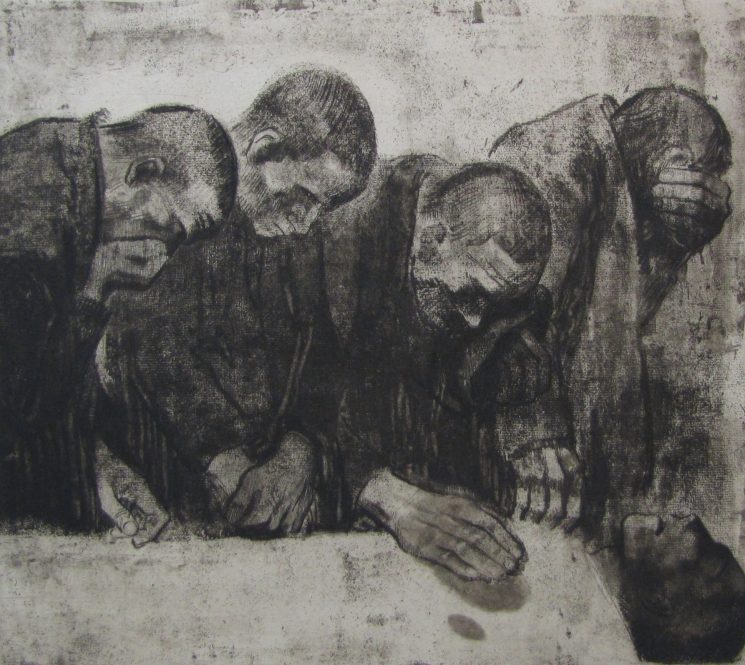The German artist Käthe Kollwitz (1867-1945) was a printmaker who used her art to advocate against social injustice, war, and inhumanity. Her name is among those taken by the feminist activist artists known as Guerrilla Girls to expose gender and ethnic bias and corruption in politics, the arts, and pop culture.
More than 100 works created by Kollwitz were part of the foundation of the permanent collection of art at the William Benton Museum of Art donated by Walter Landauer, a professor of animal genetics at UConn and a German expatriate who exclusively collected the artist’s lithographs, woodcuts, and drawings. The Benton’s permanent collection also includes the 89-piece “Guerrilla Girls Portfolio Compleat (1985-2012).”
The Benton’s current exhibition, “Käthe Kollwitz Activism Through Art,” explores the relationship between Kollwitz’s art and her activism, with stark woodcut prints depicting themes of war, poverty, and suffering.
![Käthe Kollwitz (1867-1945), Selbstbildnis [Self-Portrait] (1919), Lithograph, William Benton Museum of Art, The Walter Landauer Collection of Käthe Kollwitz.](https://today.uconn.edu/wp-content/uploads/2021/04/self-portrati-242x300.png)
“Her work was used in leaflets, postcards, and posters throughout her career, but especially during the 1920s, when she became more politically active,” says Amanda Douberley, assistant curator and academic liaison at The Benton. “At the height of her fame, the artist lent her instantly recognizable style to support a range of progressive causes, including anti-war demonstrations and also international aid efforts.”
Kollwitz, who was married to a physician, used her two sons along with the working class women and children who visited her husband’s clinic as subjects for her artwork, which addressed issues in German politics and history. She created works about the 1844 oppression of Silesian weavers, the 16th century German Peasants’ War, and World War I, when one of the casualties was her son, Peter. She also made many self-portraits.
“The self-portraits are really notable for how unflinchingly honest they are and for almost never showing her as looking particularly happy,” Douberley says. “She looks very serious.”
Douberley notes that Kollwitz once wrote that, “It is my duty to voice the sufferings of men, the never ending sufferings heaped mountain high. This is my task, but it is not an easy one.”
Douberley says the museum’s adjustments due to the pandemic presented an opportunity to present a solo exhibition of Kollwitz’s work, which had not occurred since 2007.
“We have this fantastic collection of her art, thanks to Dr. Landauer’s generosity, and it felt like a great moment to share it,” she says. “Not only because it’s such a highlight from the Benton’s collection, but also because of the way that her work might resonate for people in our contemporary moment, the kinds of issues that Kollwitz was addressing, and her political engagement. She seemed like a good choice.”
“Käthe Kollwitz: Activism Through Art” continues through April 10 at the William Benton Museum of Art. Due to the pandemic, hours are Wednesday-Friday from 10 a.m. to 4 p.m. and Saturday from 1 to 4 p.m.



